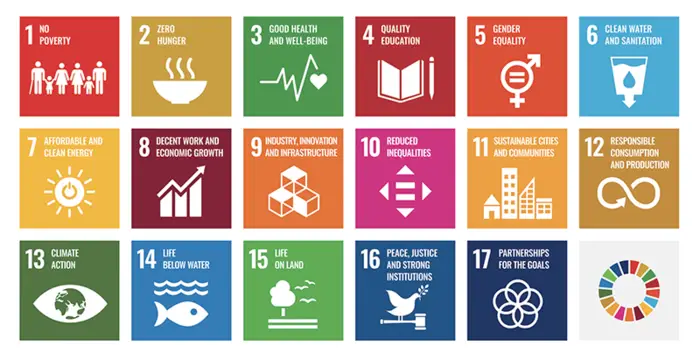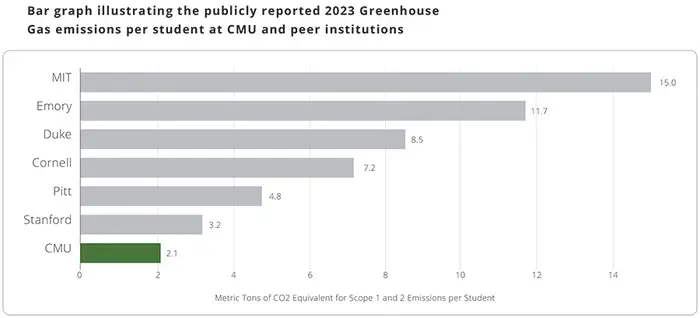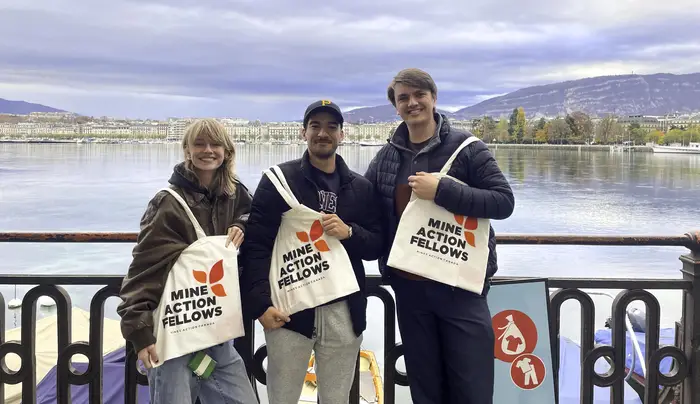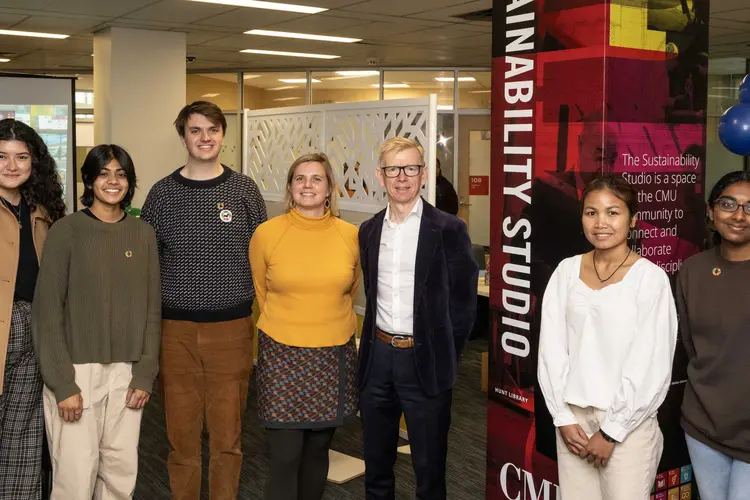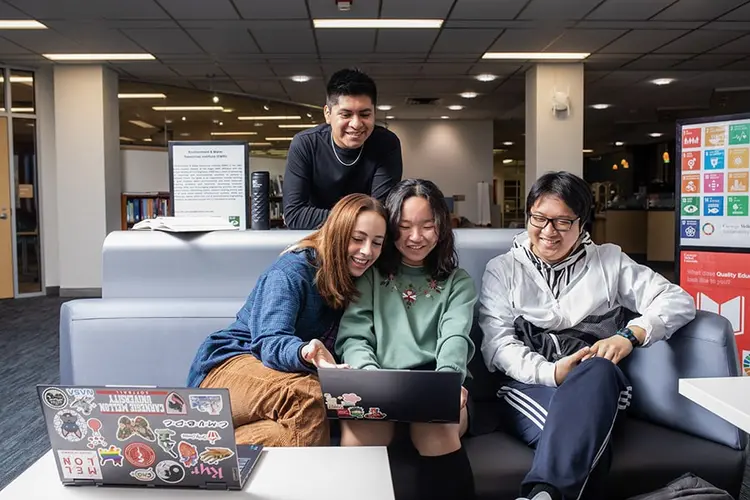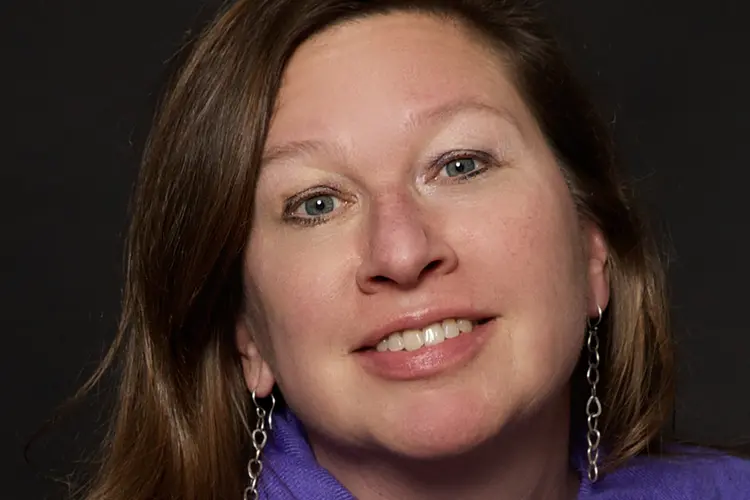
Through Commitment to Sustainability, Carnegie Mellon Community Envisions Future for All
Media Inquiries
Committed to a sustainable future for all, Carnegie Mellon University’s students, faculty and staff incorporate sustainability into all levels of education, research and practices. Through efforts like its Sustainability Initiative(opens in new window), led by Alexandra Hiniker(opens in new window), CMU is among the foremost universities championing sustainability at the local, national and international level.
The university’s approach to sustainability is guided by the uniquely comprehensive framework(opens in new window) for the international pursuit of global sustainability agreed to by all countries at the United Nations. At a macro scale, sustainability requires commitment to human health and well-being, economic stability and socioeconomic equality to make a better world for everyone.
The Sustainability Initiative uses these global standards for determining best practices, helping to demystify and broaden perceptions of sustainability and what it means for institutions and individuals.
This broader definition of sustainability is captured in the 17 Sustainable Development Goals(opens in new window) (or Global Goals) outlined by all countries at the United Nations and adopted by Carnegie Mellon in 2019 with the launch of the Sustainability Initiative by Provost James H. Garrett Jr(opens in new window). These goals are key to ensuring that issues related to social justice and economics are also addressed in sustainability efforts set by countries and institutions.
Poverty and hunger elimination, health, education, and gender equality form the bedrock of the 17 goals, which go on to address issues such as water quality, ecological and ecosystemic protection, and climate action. For the CMU community, at both the individual and institutional level, sustainability is being integrated into the work that is done across the seven schools and colleges, the libraries and the university’s administration.
On April 1, the Sustainability Initiative published its fourth Voluntary University Review of its contributions to the 17 goals. Since CMU published the world’s first in 2020, the report has evolved in purpose and structure to better serve the campus community by highlighting partnerships and sharing resources.
Sustainability in practice at CMU
CMU has proven to be a leader in environmental sustainability, having one of the lowest rates of greenhouse gas emissions per student among peer institutions.
The work of Facilities Management and Campus Services(opens in new window), under the direction of university engineer and assistant vice president Steven Guenther(opens in new window), has made this possible. Guenther is also a co-chair of the Sustainability Initiative Steering Committee(opens in new window).
The university has made and continues to impact areas such as waste management, water conservation, green design and transportation with the long-term goal of contributing to global efforts to minimize the effects of climate change. The university previously showcased its leadership in this movement during the COP28 summit in the video “Open Source: Building Community to Address Sustainability and Climate Change.”
M. Shernell Smith(opens in new window), the associate dean and executive director of the Center for Student Diversity and Inclusion(opens in new window), said sustainability has been a key component of her work during her time at Carnegie Mellon. Smith began her university career as a coordinator for service and service-learning and a housefellow for Stever House (formerly New House). Stever House would become the first residential building on campus to earn a Leadership in Energy and Environmental Design (LEED)(opens in new window) certification.
“I began connecting to environmental-based initiatives on our campus through green practices and inviting faculty and staff in a very intersectional way to be a part of community-building for this first-year building that opened on our campus,” Smith said.
Since Stever House was certified in 2003, the university has worked to ensure that every building constructed on campus has also earned LEED certification. CMU now has 26 LEED certified buildings(opens in new window).
Sustainability and social justice at CMU
It was her time leading Stever House that Smith said first inspired her to push for sustainability on campus beyond housing and construction.
“I was the only woman of color in the Division of Student Affairs who was a housefellow at that time,” she said. “As I was learning and gaining an academic understanding of sustainability, I was always pushing for equity being a part of that.”
Much of the work to create not just environmentally sustainable, but inclusive and equitable spaces for students and community members resulted from early efforts — across a variety of departments and disciplines — to make campus a more hospitable space for everyone.
“Sustainability is not just environmental. It’s not just economic. It’s also equity,” Smith said. “You can’t have a sustainable community that is not equitable.”
The Center for Student Diversity and Inclusion works directly with the Sustainability Initiative through joint programming and peer engagement, and while the 2023 VUR(opens in new window) notes that the center’s presence on campus ties into three of the Global Goals — Quality Education; Reduced Inequalities; and Peace, Justice and Strong Institutions — the work that it does extends into all areas of sustainability.
Among the Sustainability Initiative's efforts to ensure the university's commitment to solving these issues are those involving students in international diplomacy. In November 2023, three CMU students traveled to Geneva(opens in new window) to advocate for humanitarian disarmament. Four students also traveled to the United Nations General Assembly in New York that September for the SDG Action Weekend(opens in new window).
Efforts to promote sustainability happen not only through the work of the Sustainability Initiative, but at all levels of university life, including curriculum planning, facilities management, and individual and departmental research.
“You can’t have a sustainable community that is not equitable.” — M. Shernell Smith
By focusing on where issues of equity and sustainable living intersect, the Center for Student Diversity helps shed light on the subject for those enrolled at the university. This point where different kinds of solutions to issues converge, Smith stressed, is where true sustainability work happens.
“The strongest, brightest colors of a tartan are at the intersection,” she said. “Those are the kinds of things that create this nexus. No matter where you are within the CMU ecosystem, sustainability can be one of those defining principles and practices of your work.”
Other examples of community-centric sustainability work at CMU includes the Center for Shared Prosperity(opens in new window) (CSP) and its support of Colorful Backgrounds/E.X.P.O(opens in new window), which provides career support for formerly incarcerated individuals as they reintegrate into society.
CMU’s Center for the Arts in Society(opens in new window) is another collaborative effort between the Dietrich College of Humanities and Social Sciences(opens in new window) and the College of Fine Arts(opens in new window), which seeks to examine issues in society through the lens of art. Some of the work of the center includes the Hospitality Initiative(opens in new window), which focuses on questions of welcoming and belonging.
Sustainability and economic justice at CMU
Beyond campus life, Carnegie Mellon’s community remains involved in efforts to promote regional economic sustainability. The Future of Work Initiative, a project of the Block Center for Technology and Society(opens in new window) at the Heinz College of Information Systems and Public Policy(opens in new window), focuses on rigorous scientific investigation of the impact of emerging technologies on workers at all skill levels, as well as the communities they inhabit.
CSP aims to make progress in this area as well, and sits at the intersection of economic and social justice. The center, which seeks to reduce barriers to equity in the Pittsburgh region, was funded by The Heinz Endowments(opens in new window) and spent approximately $1.1 million on community projects and stipends in 2023.
"Through its unique model of collaboration in which community members and university faculty and staff work together as peers, and the development and distribution of social and technological innovations with real-world applications, the center will help to dismantle barriers to shared prosperity and equity," said CMU Professor Illah Nourbakhsh, the center's inaugural executive director.
The work of CSP centers on empowerment, helping local communities in Pittsburgh develop their own approaches to key issues and avoiding prescriptive solutions or direct interventions.
“The Center for Shared Prosperity isn’t about publishing results in peer-reviewed journals,” Nourbakhsh said in a video from the center(opens in new window) last year. “That’s simply not our goal. Our goal is engaging with the community and cultural change.”
To this end, the center supports projects such as the Equitable Procurement Program(opens in new window), which introduces institutions to minority-owned businesses in their communities to help explore potential vendor relationships, as well as Level Up(opens in new window), which encourages businesses to eliminate race- and gender-based pay disparities in their organizations.
Jay Manning, the multimedia documentation specialist for the center, explained how the idea of sustainability is critical to his work as the university engages in constant dialogue with various communities in the Pittsburgh area.
“It’s about building with the future in mind and not just the present day,” Manning said of sustainability. “It’s planning not only for business and financial purposes, but for communities.”
Those working in the Sustainability Initiative, acknowledging the diverse needs of each school and college, aim to develop a plan for each department, workshop or institute they work with in the future.
“People across CMU are already doing great work to contribute to the goals,” Hiniker said. “How can we lift this up? What are some of the ways we can connect people across campus and with external partners? We have plenty of ideas, but we want to hear from students, faculty and staff to ensure these efforts are truly collaborative and have a lasting impact.”
